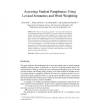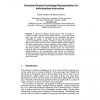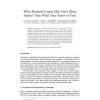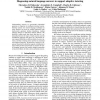31 search results - page 4 / 7 » Making sense of student use of nonverbal cues for intelligen... |
AIED
2009
Springer
14 years 2 months ago
2009
Springer
We present in this paper an approach to assessing student paraphrases in the intelligent tutoring system iSTART. The approach is based on measuring the semantic similarity between ...
COMSIS
2006
13 years 7 months ago
2006
Traditional knowledge representations were developed to encode complete, explicit and executable programs, a goal that makes them less than ideal for representing the incomplete an...
IJMMS
2007
13 years 7 months ago
2007
Predicting when a person might be frustrated can provide an intelligent system with important information about when to initiate interaction. For example, an automated Learning Co...
AIED
2009
Springer
14 years 2 months ago
2009
Springer
Researchers of educational technologies are often asked to do the impossible: make students learn and have them enjoy it. These two objectives, though not mutually exclusive, are f...
FLAIRS
2008
13 years 10 months ago
2008
Understanding answers to open-ended explanation questions is important in intelligent tutoring systems. Existing systems use natural language techniques in essay analysis, but rev...




